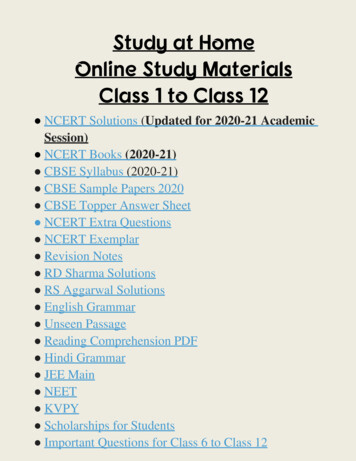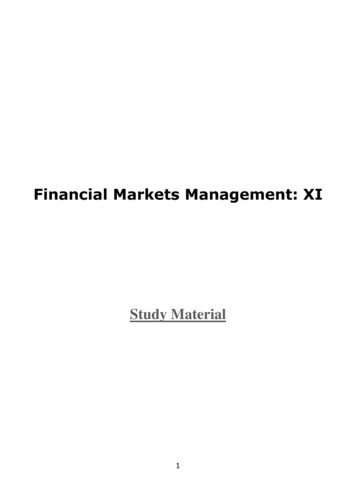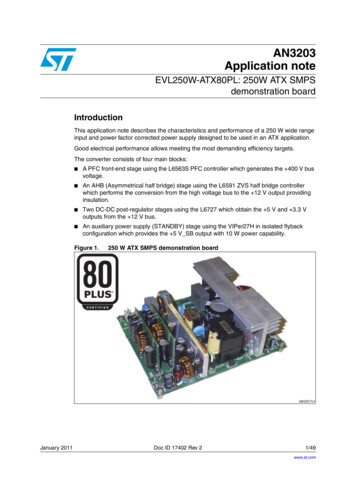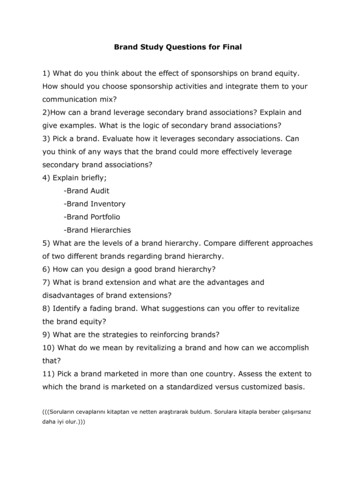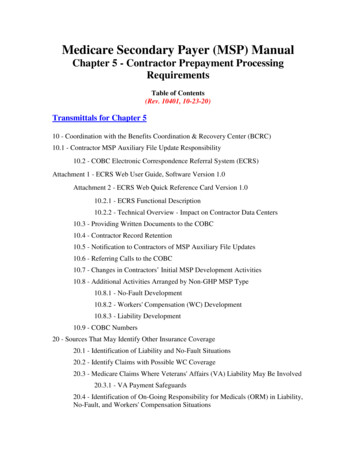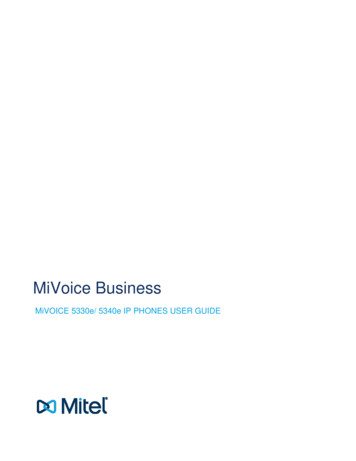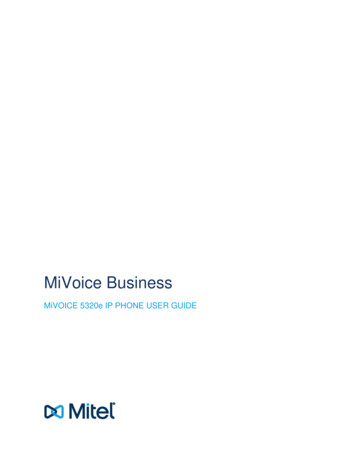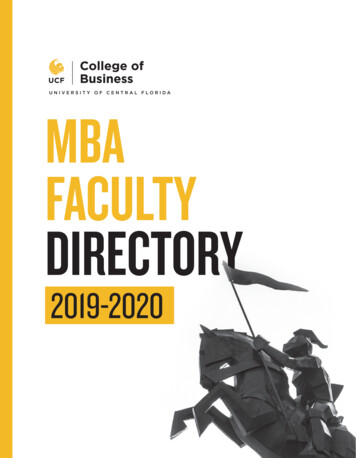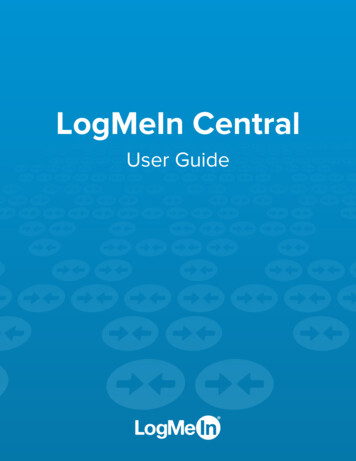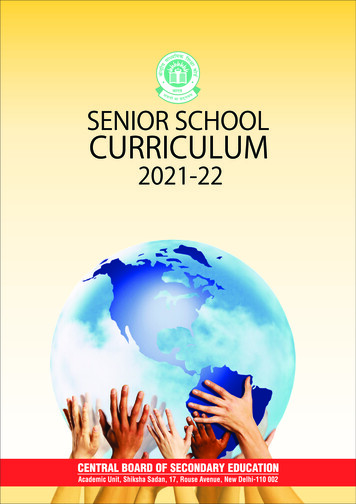
Transcription
1. PRINCIPLES OF THE CBSE CURRICULUMThe curriculum refers to the lessons and educational content to be taught to a learnerin a school. In empirical terms, it may be regarded as the sum total of a planned setof educational experiences provided to a learner by a school. It encompasses generalobjectives of learning, competencies to be attained, courses of study, subject-wiselearning outcomes and content, pedagogical practices and assessment guidelines. Thecurriculum provided by CBSE is based on National Curriculum Framework-2005 andseeks to provide opportunities for students to achieve excellence in learning.1.1Salient Features of the CBSE Senior Secondary SchoolCurriculumThe Curriculum prescribed by CBSE strives to:1.provide ample scope for holistic i.e. physical, Intellectual and social2.emphasize constructivist rather than rote learning by highlighting the3.enlist general and specific teaching and assessment objectives to4.encourage the application of knowledge and skills in real life problem5.uphold the Constitutional Values by encouraging values-based learning6.promote Critical and Creative Thinking aligned to the 21st Century7.integrate innovations in pedagogy such as experiential learning,development of students;importance of hands-on experience;make learning competency based;solving scenarios;activities;Skills in classrooms;Sport & Art-Integrated Learning ,toy-based pedagogy, storytelling,gamification etc. with technological innovations (ICT integration) tokeep pace with the global trends in various disciplines;1
1.21.38.promote inclusive practices as an overriding consideration in all educational9.enhance and support learning by different types of assessments; andactivities;10.integrate environmental education in various disciplines from classes I- XII.1.achieve desired national level of competencies in cognitive, affective and2.facilitate acquisition of 21st Century Skills and enhance self and social3.promote Cooperative Learning, Collaborative Learning, Self-directed learning4.promote Authentic Assessments based on real world tasks involving meaningful5.promote Life Skills , inculcate values , foster cultural learning andObjectives of the Curriculumpsychomotor domains;awareness through thematic or multidisciplinary approach;etc. to facilitate realization of learning outcomes;application of knowledge and skills;international understanding in an interdependent society;6.acquire the ability to utilize technology and information for the betterment7.strengthen knowledge and attitude related to livelihood skills and promote8.develop the ability to appreciate art and showcase talents;9.of humankind;lifelong learning;promote physical fitness, health and well-beingCurriculum Areas at Senior Secondary Level For the purpose of fostering competences in learners, the curriculum encompassesseven major learning areas, which are: Languages, Humanities, Mathematics,Sciences, Skill Subjects, General Studies and Health and Physical Education. Theseareas are broadly divided into electives and compulsory areas as detailed below:-2
LanguagesElectivesElectivesSkill ElectivesGeneral StudiesHealth & Physical Education*Work ExperienceCompulsory*Work experience is subsumed in Health and Physical Education1.3.1 Elective Areas:(i)Languages include Hindi, English and other 30 languages. The curriculain languages focus on listening, speaking, reading and writing skillsfor developing effective communicative proficiency. Learners uselanguage to comprehend, acquire and communicate ideas.(ii)Humanities and Social Sciences- Geography, History, Economics,Home Science, Sociology, Fine Arts, Political Science, and relatedsubjects promote the learning of history and culture, geographicalenvironment, global institutions, constitutional values and norms,politics, economy, interpersonal and societal interactions, civicresponsibilities and the interplay of all these. Learners appreciateand value every human’s right to feel respected and safe, and, inthis regard, also understand their Fundamental Rights and Duties andbehave responsibly. Learners learn to be tolerant and empathetictowards others through the study of these subjects.(iii) Sciences: Biology, Chemistry, Physics, Computer Science, andInformatics Practices help in making students perceptive about matterand energy, nature, the environment, technological breakthroughs inscience. The focus is on knowledge and skills to develop a scientificattitude and to use and apply such knowledge for improving the qualityof life. The Curriculum promotes the ability to engage with sciencerelated issues, and with the ideas of science, as a reflective citizen bybeing able to explain phenomena scientifically, evaluate and design3
scientific enquiry, and interpret data and evidence scientifically.Students understand the importance of to apply scientific knowledgein the context of real-life situations and gain competencies thatenable them to participate effectively and productively in life.(iv) Mathematics includes acquiring the concepts related to numbers,operations, computation, measurement, geometry, probabilityand statistics, the skill to calculate and organize and the ability toapply this knowledge and acquired skills in their daily life. It alsoincludes understanding of the principles of reasoning and problemsolving. Learners identify, integrate and apply numerical and spatialconcepts and techniques. They have clarity of concepts and are ableto connect them to the real world. Learners rationalize and reasonabout pre-defined arrangements, norms and relationships in order tocomprehend, decode, validate and develop relevant patterns.(v)Business and commerce based electives- Business Studies,Accountancy, Entrepreneurship, Economics and related subjectshelp in gaining understanding about core business disciplines. Theyunderstand the concept like, the exchange of items of value orproducts between persons or companies and the meaning / relevance/significance of any such exchange of money for a product, service, orinformation.(vi) Visual; Performing and Creative Arts- Subjects like Dance, Drama,Music, Heritage Crafts, Fine Arts, Sculpture and related subjects aimto help learners cultivate an interest and appreciation for arts andencourage them to enthusiastically participate in related activities,thus, promoting abilities such as imagination, creativity, value arts,and the cultural heritage.(vii) Skill Electives help in development of professional competencies,which are analytical, applied and outcome based. Undergoing skillstraining in schools can help students learn about a trade progressivelyto create a product and also to become a problem solver in real life.4
At present many Skill electives are being offered by the Board in thefields of Hospitality and Tourism, emerging technology like ArtificialIntelligence, Geospatial Technology, Finance, Business, and Retail &Insurance etc. Students can also choose subject from diverse areassuch as Fashion Design, Agriculture, Banking, Mass-Media Healthcareand many more students.(viii) Health and Physical Education focuses on holistic development,both mental and physical, understanding the importance of physicalfitness, health, well-being and the factors that contribute to them.Focus of this area is on helping learners develop a positive attitudeand commitment to lifelong, healthy active living and the capacity tolive satisfying, productive lives with the help of health management,indigenous sports, yoga, NCC, self-defense, fitness and lifestylechoices. These learning areas are to be integrated with each other in termsof knowledge, skills (life and livelihood), comprehension, valuesand attitudes. Learners should get opportunities to think laterally,critically, identify opportunity, challenge their potential and be opento challenges. Learners value and engage in practices that promotephysical, cognitive, emotional and social development and wellbeing.This enables learners to connect different areas of knowledge,application and values with their own lives and the world aroundthem. The holistic nature of human learning and knowledge should bebrought forth throughout.(ix) General Studies: The purpose of orienting students to GeneralStudies is to develop in them an appreciation for the holistic nature ofknowledge. In contemporary times, familiarity with General Studies isindispensable because at the senior school stage there is an element ofspecialization due to which the students do not get exposed to some vitaldisciplines/areas of study that are not covered in their specialized field.The documents with details of Health and Physical Education andGeneral Studies are available on www.cbseacademic.nic.in5
2. IMPLEMENTATION OF CURRICULUM2.1School Curriculum Committee The Board mandates that all schools must setup a School CurriculumCommittee comprising teachers from each curricular area. The SchoolCurriculum Committee would define activities for pedagogical practices,evolve a plan of assessment and mechanism of feedback and reflectionand ensure its implementation. The committee would also ensure that thetextbooks/ reference materials are age appropriate, incorporate inclusiveprinciples, gender sensitive, have valid content and do not contain anymaterial which may hurt the sentiments of any community. The committeewill then send the list of books to the Principal to take action as perpara 2.4.7 (b) of the Affiliation Byelaws, 2018.The committee would alsoensure that the reference materials reflect conformity with the underlyingprinciples of the Constitution of India and are compliant with NCF-2005.Issues of gender, social, cultural and regional disparities must be taken careof in the curriculum transaction.2.2Pedagogical Leadership: Principals have a crucial role in the evolution of the teaching- learningecosystem as pedagogical leader of their schools. As pedagogical leaders,they are expected to undertake the following:a)Lead, Guide and Support the teaching and learning processes in theschool by focusing on classroom specific requirements for transactingthe curriculum, so that both teachers and students perform at theirbest.b)Direct the entire focus of all school activities towards the students’learning and acquiring of necessary competencies. Every activity takenup by the school, therefore, should be mapped for the competencies,and for life skills, values, etc., being acquired by the students.c)6Prepare Annual Pedagogical Plan of the school by designing anddeveloping annual plan for the school by giving equal importance toelective and compulsory areas.
d)Promote innovative pedagogy, with special focus on integrating art,sports and ICT (Information and Communication Technology) witheducation, and use active and experiential learning methods in theclassrooms.e)Ensure joyful learning at all levels through use of such innovativef)Develop school specific resources for teaching and learning, in theg)Ensure proper in-house training of teachers in the school to enableh)To be up to date with all new ideas and tools, etc. being used ini)To make efforts to learn from the best practices of other schools, bypedagogy.form of lesson plans, e-content, use of mathematics and science kitsdeveloped by NCERT, etc.them to unleash their own unique capabilities and creativity in theirclassrooms.education at the global level and constantly innovate the pedagogyof the school.arranging for discussions with Principals of such schools, or throughobservation visits of teachers to other schools. Respecting the autonomy of every school, the Board has not laid downthe structure or format of the annual pedagogical plan. A schools needs toprepare its unique, implementable and innovative annual plan. This planmust be with realistic timelines that should include administrative inputsand detailed pedagogical aspects.2.3Pedagogical Practices by Teachers The pedagogical practices should be learner centric. It is expectedof a teacher to ensure an atmosphere for students to feel free to askquestions. They would promote active learning among students with afocus on reflections, connecting with the world around them, creating andconstructing knowledge. The role of a teacher should be that of a facilitatorwho would encourage collaborative learning and development of multiple7
skills through the generous use of resources via diverse approaches fortransacting the curriculum. Teachers should follow inclusive principles and not label children as ‘slowlearners’ or ‘bright students’, or ‘problem children’. They should insteadattend to the individual difference of students by diagnosing and modifyingtheir pedagogic planning. As far as possible, Arts should be integrated inteaching, especially while teaching the concept which students find difficultto understand.2.4Competency based Learning: To face the challenges of 21st Century, education should be competency basedand Principals as Pedagogical Leaders must create conducive environmentfor development of competencies among the students. Competency basedLearning focuses on the student’s demonstration of desired learningoutcomes as central to the learning process. Learning outcomes arestatements of abilities that are expected students will gain as a result oflearning the activity. Learning outcomes are, thus, statements of what alearner is expected to know, understand and/or be able to demonstrate aftercompletion of a process of learning. Therefore, the focus is on measuringlearning through attainment of prescribed learning outcomes, rather thanon measuring time. Experiential and active learning are the recommendpedagogies for Competency Based Learning. Experiential Learning promotescritical thinking, creativity and effective study skills among students.Learning Outcomes sugested by NCERT for classes’ I-X must be adopted byall the schools and teaching-learning process may be changed in the lightof these outcomes. The schools are expected to have well-defined Learningobjectives mapped with the stipulated learning outcomes for every gradethat are observable and measurable, and empower learners to focus onmastery of valuable skills and knowledge. It is expected that teachers willprovide meaningful and joyful learning experiences to the students byadopting variety of innovative pedagogies or instructional activities andgo beyond textbooks. Schools are expected to track the attainment ofLearning Outcomes in each learner and ensure that no child is left behind.8
2.5Lesson/ Unit Plan Specific Lesson Plans for the topics are to be prepared by the teachers.These plan may have the following parts: Specific Learning Outcomes; Pedagogical Strategies; Group activities/experiments/hands-on-learning; Interdisciplinary Linkages and infusion of Life-skills, Values, Gendersensitivity etc.; Resources (including ICT); Assessment items for measuring the attainment of the LearningOutcome Feedback and Remedial Teaching Plan. Inclusive Practices2.6Classroom and School Environment School environment should be conducive for holistic development of thestudents. The school should focus on health and hygiene by adoptinginclusive practices. As part of the policy the school should adopt practiceswhich will promote mental health. In this direction, the schools may followthe guidelines issued by the Board on making the school a No-Anger Zone orAnger Free Zone. The board has developed school health manuals which areavailable on www.cbseacademic.nic.in. The time table in the school shouldtake care of proper rest and intake of healthy foods and the children learnsubjects with relaxation. School must also ensure that Children avoid theintake of junk food and should ban it around school premises. Intake of thehealthy foods should be encouraged with activities described in circularissued by CBSE. The surroundings and daily life activities and situations are the best9
experiential teachers for the students. Teachers must make efforts todraw examples and group activities from daily life observations within theclassroom/within the school and surroundings, and encourage presentationsand reflection by the students once the activity is completed, to developthe skills of critical thinking and communication. Children learn a lot through peer learning. To promote peer learning,flexible seating arrangements may be made available during the classroomtransactions. The seating should also take care of the needs of the studentswith disabilities as well. Learning should focus on individual differencesand promote collaborative learning. The classroom activities must beconnected to the immediate environment of children. The school shouldmaintain connection with the parents and the progress of children shouldbe communicated to the parents, and, if needed remedial measures betaken up for improving the learning outcomes.2.7Creating Cross-Curricular Linkages Creating cross-curricular linkages are vital to learning as they help toconnect prior knowledge with new information. For example, Mathematicaldata handling and interpretation can be effectively applied in geographyand science. Children can write better-framed answers in history,geography and science when they have learnt how to write explanations/short descriptions in a language. Similarly, Life Skills like empathy, problemsolving and interpersonal communications can be easily integrated withthe study of literature and other areas. Universal Values, Life Skills andConstitutional Values with emphasis on realization of Fundamental Dutiesmay be incorporated depending upon context in almost all the subjects.2.8Special emphasis on Integrating Arts in education: All disciplines being pursued by students at all stages require creativethinking and problem-solving abilities. Therefore, when Art is integratedwith education, it helps the child apply art-based enquiry, investigation andexploration, critical thinking and creativity for a deeper understanding ofthe concepts/topics. Secondly, Art Integrated learning is a strong contender10
for experiential learning, as it enables the student to derive meaning andunderstanding, directly from the learning experience. Thirdly, this kind ofintegration not only makes the teaching and learning process joyful, it alsohas a positive impact on the development of certain life skills, such as,communication skills, reflection and enquiry skills, un-conditioning of themind leading to higher confidence levels and self-esteem, appreciation foraesthetics and creativity, etc. Fourthly, this kind of integration broadensthe mind of the student, and enables him/her to see the multi-disciplinarylinks between subjects, topics, and real life. Schools are, thus, required totake up the integration of Art with the teaching learning process. It must be understood that Art Education and Art Integrated Educationmay be mutually exclusive, but they build upon each other and strengtheneach other. Art Education is not only relevant for developing creativity andappreciation of art among students, but is also necessary for inculcating artbased enquiry skills in the students. Art Education is a necessary precursorfor the adoption of Art Integrated learning.2.8.1 Art Education and Art Integration:The following two-pronged approach is followed during a session:(i)Art education continues to be an integral part of the curriculum, asa compulsory area at Secondary level. The schools may also promoteand offer Visual and Performing Arts based subjects at the Secondaryand Senior Secondary level.(ii)Art needs to be integrated with the teaching and learning process ofall subjects from classes 1 to 12, to promote active and experientiallearning for “connecting knowledge to life outside the school, ensuringthat learning shifts away from rote methods and for enriching thecurriculum, so that it goes beyond textbooks.”2.8.2 Art Integrated Pedagogy: While preparing its annual pedagogical plan under the leadership of thePrincipal of the school, the school must plan out in detail the Art Education11
to be imparted at various levels, and how that Art can be integrated withclassroom learning of various subjects. The focus must be on mutually reinforcing Art as a subject and Art as a tool for learning, with efforts towardsseamless integration. Team teaching (combination of subject teachers andArt teachers) would also strengthen the integration. For implementing this in classrooms, the subject teacher picks the topic/concept/idea that she wants to teach by integrating art. The teacher cando this jointly with the Art teacher too. Then, the subject teacher collaborates with the Art teacher to align the pedagogy. Next, the teacher teachesthe topic/concept/idea ensuring active learning and ensuring that both thesubject and Art are integrated well and there is learning in both areas. Finally, the teacher prepares a rubric to assess the student in both the areas– that is, the topic taught and the Art used.2.921st Century Skills: There is an increased awareness among the educators of the need tointegrate what are called as 21st Century skills in educational systems.There are three key 21st century skills i.e. Learning Skills, Literacy Skillsand Life Skills.12Learning skills include: Critical Thinking Creativity Communication CollaborationLiteracy skills include: Information literacy Media literacy Technology literacy
Life skills include: Flexibility Leadership Initiative Productivity Self-awareness Schools must focus on enhancing the skills required for a successful adultlife in 21st Century. It is important that the students are able to thinkscientifically, mathematically or artistically to face the real-life challengesin an information and technology driven world and enhance their inherentpotential. CBSE has publised a handbook on 21st century skills available atits website. Schools may further refer to it.2.10Inclusive Education: Inclusive approach in education is a prerequisite for ensuring fullparticipation of all students with equal opportunity in all areas withoutany discrimination. Inclusive attitude in all staff and faculty members iscrucial for successful inclusive education. Therefore, all the membersof teaching and non-teaching staff should be sensitized on the issues ofinclusive education. Students without disabilities should also be sensitized.Schools must organize these sensitization programmes with the support ofexperts from respective field of disabilities. Capacity Building Programmeson Inclusive Education may be organized in collaboration with the CBSECentres of Excellence. Board has made the appointment of special educatormandatory to all the schools affiliated to the CBSE. Special Educatorsmust possess the qualification as prescribed by the Rehabilitation Councilof India. (CBSE Circular No. 31/2015). CBSE has published a handbook onInclusive Education available at its website.13
3. SCHEME OF STUDIESClass XI and XII is a composite course. Students need to take only those subjects inclass XI which he/she intends to continue in class-XII. Students can offer a minimumof 5 or more subjects in class XI. They need to continue the same subjects in class XII.3.1Combination of Subjects: Subjects can be offered asunder:SubjectName of SubjectsSubject 1Hindi Elective or Hindi Core or EnglishElective or English CoreSubject 2Any one Language from Group – L not opted asSubject 1ORAny one Elective from the Group – ASubject 3,Any three electives either from Group – A OrGroup-SORSubject 4,andSubject 5Any three from Combination of Group – A andGroup – SCompulsoryAdditional Subject OptionalSubject 6Any one elective or Language from anysubject group not opted as subjects 1-5Subjects ofInternal AssessmentSubject 7to 9 (to betaken byall RegularCandidates)*Work ExperienceHealth and Physical EducationGeneral Studies*Work experience is subsumed in Health and Physical Educationa)14Hindi or English must be one of the two languages to be studied inclass XI and XII. Hindi and English can also be offered simultaneously.In Hindi and English, two courses have been provided for class XI
and XII keeping in view the varying backgrounds of the studentsand a student may either opt Hindi Elective (Code 002) or HindiCore (Code 302) and English Elective (Code-001) or English Core(Code-301). However, the same language cannot be offered both atCore and Elective levels.In addition to above, the following combinations cannot be taken together;3.1.1.1 Business Studies (Code 054) and Business Administration (Code833)3.1.1.2 Out of three Computer Science/IT related subjects i.e.Informatics Practices (065), Computer Science (Code 083), andInformation Technology (Code 802), a candidate can opt only forone subject.3.1.1.3Biology (Code 044) and Biotechnology (Code 045)3.1.1.4Mathematics (Code 041) and Applied Mathematics (Code 241)b)The first 5 subjects in the chronological order of filling the subjectsc)A candidate can also offer an additional elective which may either bed)While transacting the Curriculum, due emphasis should be laid onin the online registration system/ Mark Sheet are considered as Mainsubjects.a language at elective level or, any other elective subject.National Identity and Values Education. Schools are expected to drawtheir own programmes in this area in accordance with the guidelinesgiven from time to time by the Board. Likewise, programmes inGeneral Studies and Health and Physical Education be planned inaccordance with the guidelines brought out by the Board.e)For candidates who take 6 subjects (5 main and 1 additional subject)and pass in all 6 subjects, the percentage is to be calculated by theemployer/institution/university according to the norms of employer/institution/university in which the candidate will be seeking admission.15
f)If a student has taken 6th subjects, and if he/she fails in any oneof first five subjects, the same will be replaced by the 6th subjectprovided the candidate satisfies the scheme of studies i.e. afterreplacement either Hindi or English remains as one of the main fivesubjects.g)Skill electives can be offered along with any subject, as per theh)Board is extending several exemptions/concessions to candidatesscheme of studies.with disabilities as defined in the “THE RIGHTS OF PERSONS WITHDISABILITIES ACT 2016”. Exemptions/Concessions extended to Personswith Benchmark Disabilities for Class X & XII Examinations conductedby the Board and the Standard Operating Procedure for availing theseconcessions are available on : https://www.cbse.gov.in/cbsenew/Examination Circular/2019/5CIRCULAR.pdf Schools and candidates may also refer to the circulars issued by theBoard from time to time on this matter.i)For Regional Languages, the Board prescribes the textbooks beingfollowed in classes XI and XII in the respective State Boards wherethe language is taught. Schools are also advised to bring to the noticeof CBSE the changes, if any, brought out at the commencement ofthe session by the respective State Boards, in the textbooks of thelanguage of their State. Schools are directed to strictly follow thetextbooks prescribed by CBSE in its curriculum. Changes, if any, canbe adopted only when CBSE notifies them. School will be responsiblefor any issue arising out of School not following Boards’ directives.16
a. Subjects OfferedLIST OF SUBJECTSLANGUAGES (GROUP – L)S No CODE 1ENGLISH ELECTIVE301ENGLISH CORE002HINDI ELECTIVE302HINDI CORE003URDU ELECTIVE303URDU CORE022SANSKRIT ELECTIVE322SANSKRIT TAMIL080----0208107TELUGU080----020189TELUGU 7116ARABIC080----02018117TIBETAN080-----020234Any OneAny OneAny OneAny OneAny One17
TheoryPracticalIAAcademics Electives (GROUP-A)S No CODE NAME1027HISTORY080--0202028POLITICAL 0050020036CARNATIC MUSIC VOCALCARNATIC MUSIC MEL.INS.CARNATIC PER. INS.MRIDANGAMHINDUSTANI MUSICVOCALHINDUSTANI MUSICMEL. INS.HINDUSTANI PER. AnyOne
0--020070030---9042APPLIED EERING GRAPHICS070030----13048PHYSICAL 20Any OneAny OneAnyone15054APPLIED/ COMMERCIAL ARTBUSINESS STUDIES16055ACCOUNTANCY080---02017056KATHAK – DANCE030070----057030070----058BHARATNATYAM –DANCEKUCHIPUDI – DANCE030070---059ODISSI – DANCE030070----060MANIPURI – DANCE030070---061KATHAKALI – DANCE030070----18064HOME SCIENCE070030---19065070030---083INFORMATICS PRACTICESCOMPUTER SCIENCE070030---066ENTREPRENEURSHIP070----03020Any oneAny one19
21073070----030074KNOWLEDGE TRADITION & PRACTICES OF INDIALEGAL STUDIES22080---02023076NATIONAL CADET CORPS (NCC)070030----Skills Elective (Group-S)S. SUB. NAMENo. CODEJOB 8056.7.8068078.8089. 80910. 81011. 81112. 81213. 81314. 81415. 81616. 81720RETAILINFORMATIONTECHNOLOGYWEB APPLICATIONAUTOMOTIVESALES ASSOCIATEIT HELPDESK ASSISTANTWEB DEVELOPERAUTOMOTIVE SERVICE TECHNICIANFINANCIAL MARKETS EQUITY DEALER/MUTUAL FUNDMANAGEMENTAGENTTOURISMTOUR GUIDEBEAUTY & WELLBEAUTY THERAPISTNESSAGRICULTUREAGRICULTUREEXTENSIO
will then send the list of books to the Principal to take action as per para 2.4.7 (b) of the Affiliation Byelaws, 2018.The committee would also ensure that the reference materials reflect conformity with the underlying principles of t
